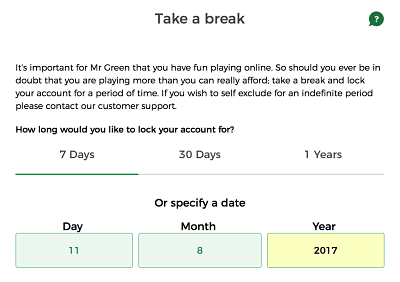
LANGUAGE & LOCATION


Self-exclusion is a form of gambling harm prevention. Essentially, a player that feels like gambling has become too much or too dangerous, can choose to self-exclude from visiting gambling sites – both land-based and online – anytime they want.
As both gambling activity and responsible gaming awareness have grown in recent years, self-exclusion has become a necessary term that every player must be familiar with.
With this guide, you can learn more about self-exclusion, how exactly it works, and where it applies. Join us as we discuss voluntary and mandatory exclusions, as well as possible exclusion timeframes. Lastly, you can browse a list of the most famous self-exclusion tools that might come in handy one day.
Self-exclusion is a process of deliberate and consciousness restraint from any type of gambling, enabled and conducted by both the player and the service provider.
By opting for this method, the person agrees with being deprived of gambling services for a pre-defined period of time. Clearly displayed information on how to do so is a legal requirement that has to be provided by every licensed gambling provider.
Player who wishes to exclude themselves from gambling may visit anti-gambling software or similar organization websites where they can follow instructions and sign up for self-exclusion.
Moreover, self-exclusion is a voluntary process. Players voluntarily choose to place a ban that prevents them from visiting online casino sites and similar gambling-related websites.
The procedure for self-exclusion is simple.
The relevant steps that must be taken in order to make the exclusion possible are listed across all main branches of the gambling industry, although the entire procedure is probably easier at online casinos. The scheme includes the following:
According to gambling laws and regulations, online casinos have a legal obligation to provide a separate Responsible Gambling section with clear information on how to initiate self-exclusion.
The first step would be pausing your online casino user account for either a short time period or even closing it for good so that you would not “fall off the wagon”.
Additional tests to evaluate the level of potentially dangerous behaviour that you are displaying are available on the same page, where you can estimate the risk through a series of questions. The results of the questionnaire will be followed by useful links and materials as well as the suggestions for downloading specialized software which allows you to block gambling sites.
Online casinos often provide separate phone lines for people who would like to start the process of self-exclusion; however, one can simply contact the casino’s customer support who will then instruct them on how to proceed.
Alternatively, one can visit the Remote Gambling Association (main online global gambling industry representative) website, where the list of online casino departments that deal with self-exclusion can be obtained or simply get in touch with either GamCare’s NetLine or National Gambling Helpline whose trained operators will assist you further.
Self-exclusion is a type of voluntary exclusion, which means that the players chooses to be excluded from gambling sites. It’s a self-initiated step, which is very important as it signals that the players has not only recognized that there is a problem, but is also ready to work on it.
Most casinos, both land-based and online, offer self-exclusion services to players, making it easier for the punters to get excluded when they deem necessary.
On the other hand, mandatory exclusion is a process initiated by the regulator or gambling site, or in some cases, the court.
The difference between the two is that mandatory exclusion is not very widespread and is usually used as a last-call measure to help players with a gambling problem.
Casinos complying with various responsible gaming practices often use gambling activity monitoring to recognize patterns of behaviour among the players. When they notice that someone is betting too much, too often, or doing something similar that triggers the markers, they can contact the player and offer advice or provide help. Sometimes, the only solution possible is exclusion, when players go overboard, and the casino is forced to place them on a ban. This is not something that is easily done, and it is a measure of prevention and protection of the players who are at serious risk from slipping into problem gambling.
With self-exclusion, players can choose how long they are going to be banned from accessing gambling sites. In most cases, the minimum period is 6 months, but most punters set a longer timeframe.
On the other hand, mandatory exclusion often lasts longer, and is generally more restrictive than the voluntary program.

Self-exclusion tools and programs vary from market to market, country to country.
For players in the UK, the most common option is GAMSTOP. You can learn more about self-exclusion and GAMSTOP directly at the GambleAware guide for self-exclusion and gambling blocking.
Here’s an overview of all self-exclusion services and anti-gambling software you can use across the globe.
Please bear in mind that regulation is patchy across many Asian countries, so tools are mostly self-managed or third-party.
Considering how expansive iGaming has become, one can never have too much support and security. The ways in which online gambling affects us are impossible to count, and new ones will continue to grow. Therefore, it’s hard to imagine how self-exclusion could possibly have disadvantages. Yet, there are a few.
Here’s a list of pros and cons for self-excluding at online casinos.
Gambling addiction is a serious adversary, one that’s not easy to defeat. And although exclusion can help in many ways, it is not all-encompassing.
Namely, self-exclusion tools often cover only casinos that are licensed in their jurisdictions. For instance, a tool that works in the UK will prohibit players from accessing online casinos working in the UK that are licensed by the UKGC. And considering the UK is a very strict market, that is not a problem for the most part.
However, players from other markets are often faced with a choice to access offshore casinos that are not exactly licensed to offer services in their market, but they do accept players that come from that specific market. As a result, players are then exposed to rogue, unlicensed venues, which can be far worse than playing at regulated gambling sites.
That is why it would be wise to use multiple self-exclusion services to cover all the based and restrict access to most gambling sites.
Self-exclusion is often not used on its own. Although it can be very effective – and it is, for so many players – it is often used together with other forms of gambling help/prevention.
The most common combination is with anti-gambling software, such as BetBlocker or Gamban, or Gamstop.
Anti-gambling software is a fantastic and very efficient way to gain control over one’s gaming activity. You can learn more about anti-gambling software right here.
Finally, a third source of help that many players come to rely on is support. A strong support system, that comes from friends and family, is crucial for players to establish and later maintain control over their gaming. That is why it is important to communicate with others and ask for help as soon as possible.
The gambling thrill is highly addictive, so coming back for more is easy to understand. After all, many gambling venues bank on it. But when gambling starts interfering with everyday life and becomes so overwhelming that the healthy adrenaline boost is replaced by obsessive behaviour that can have serious consequences, it may be even too late. Or the right time to seek help and use anti-gambling tools, such as self-exclusion.
Self-exclusion is one of the most important tools that casino players can have. It’s not a cure-all, but rather a step towards harm prevention and help.
If you feel like gambling is taking a toll on your mental health, like you are not having fun anymore or that you are not enjoying yourself like you used to, it might be a good decision to take a break. If the symptoms are more severe, consider self-exclusion and seek help from trained professionals who can assist you with anything that you might need.

An English teacher in his previous life, Milos went on from being a sports journalist to freelance content writer who immediately understood the growing need for quality content. This led him to build MM Editing – a digital marketing agency specializing in content production, management, and promotion. MM Editing has been around since 2016 and continues to serve content to numerous casino affiliate websites.
![]()
 April 4, 2025
April 4, 2025
![]()
 March 17, 2025
March 17, 2025